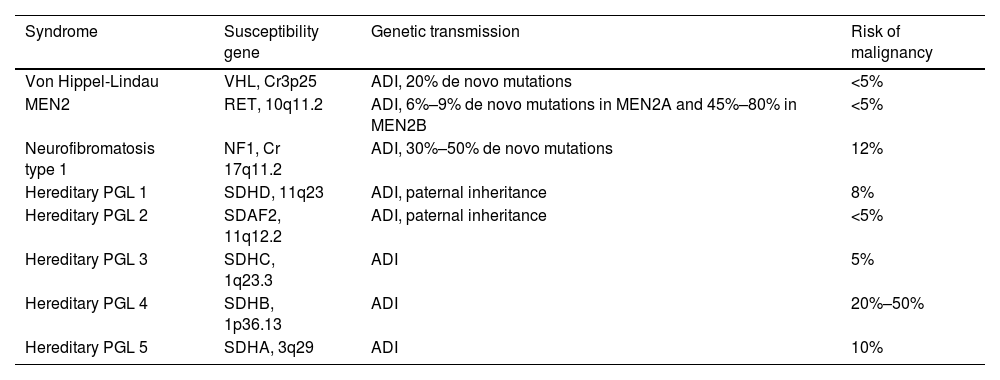Pheochromocytomas are neuroendocrine tumors that derive from sympathetic adrenomedullary chromaffin tissue and produce catecholamines. Due to the excess release of catecholamines, they can produce arterial hypertension, tachycardia, sweating, headache and a large number of other clinical manifestations secondary to the stimulation of α and β adrenoreceptors. Screening for pheochromocytoma is recommended in patients with paroxysmal, resistant or early-onset arterial hypertension, in cases with symptoms suggestive of catecholamine hypersecretion, patients with hereditary syndromes associated with pheochromocytomas, diabetes mellitus of atypical presentation and in adrenal incidentalomas with radiological characteristics not typical of adenoma (with > 10 Hounsfield Units on non-contrast CT). In this article we present an exhaustive review of the clinical data and complications that can be associated with pheochromocytomas, and we summarize the main indications for pheochromocytoma screening.
Los feocromocitomas son tumores neuroendocrinos que derivan del tejido cromafín adrenomedular simpático y que producen catecolaminas. Como consecuencia del exceso de liberación de catecolaminas pueden producir hipertensión arterial, taquicardia, sudoración, cefalea y un amplio número de otras manifestaciones clínicas secundarias a la estimulación de los adrenorreceptores α y β. Se recomienda realizar cribado del feocromocitoma en los pacientes con hipertensión arterial paroxística, resistente o de inicio temprano, en los casos que presenten clínica sugerente de secreción de catecolaminas, pacientes con síndromes hereditarios asociados a feocromocitomas, diabetes mellitus de presentación atípica y en incidentalomas adrenales con características radiológicas no típicas de adenoma (con > 10 Unidades Hounsfield en el TAC sin contraste). En este trabajo presentamos una revisión exhaustiva sobre los datos clínicos y las complicaciones que se pueden asociar a los feocromocitomas y resumimos las principales indicaciones de cribado del feocromocitoma.
Article
Diríjase desde aquí a la web de la >>>FESEMI<<< e inicie sesión mediante el formulario que se encuentra en la barra superior, pulsando sobre el candado.

Una vez autentificado, en la misma web de FESEMI, en el menú superior, elija la opción deseada.

>>>FESEMI<<<











